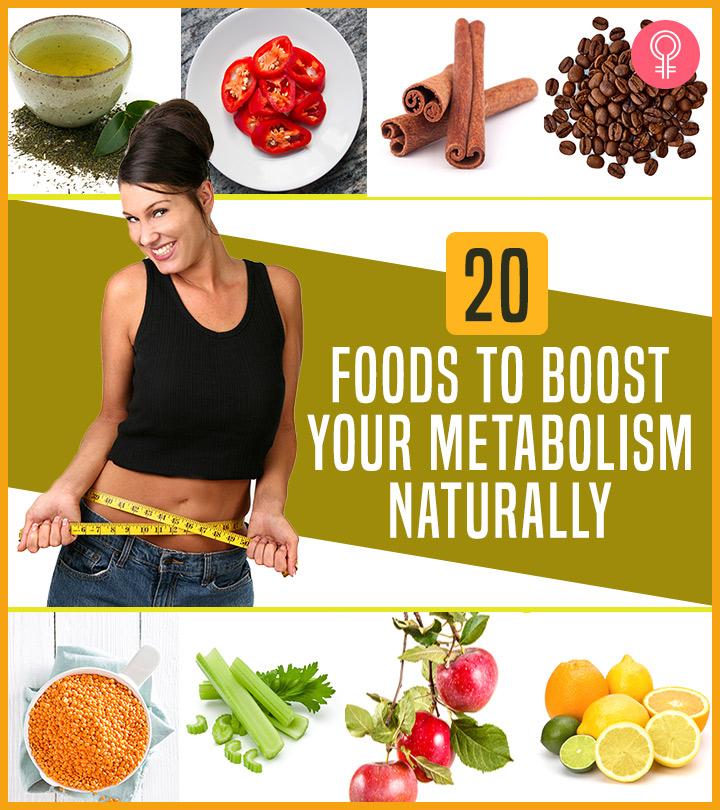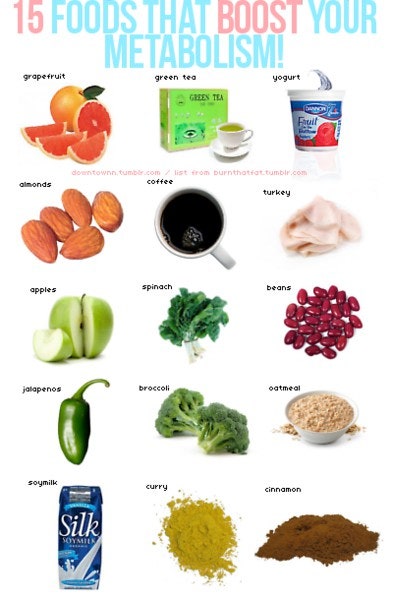Foods that boost metabolism include spicy peppers and chili, green tea, ginger, coffee, and lean proteins. A faster metabolism can help with weight loss and sustained energy levels throughout the day.
Incorporating these metabolism-boosting foods into your diet can help kick-start your body’s calorie-burning process. Spicy foods, such as peppers and chili, contain capsaicin, which has been shown to increase metabolism. Green tea is a natural thermogenic and can enhance fat oxidation.
Ginger has been found to increase calorie burn and reduce hunger. Coffee can temporarily boost metabolism due to its caffeine content. Lastly, lean proteins require more energy to digest, thus increasing calorie burn. By including these foods in your diet, you can give your metabolism a natural boost and support your overall health and wellness.
Understanding Metabolism
Boost your metabolism with these foods that are known to increase calorie burning. Incorporating foods like lean proteins, spicy peppers, and green tea can help rev up your metabolism for better weight management.
Understanding Metabolism What is metabolism? Metabolism refers to the chemical processes that occur within an organism to maintain life. In simpler terms, it is the rate at which your body burns calories to produce energy. Each person’s metabolism is unique, influenced by factors such as age, gender, genetics, and activity level. How does metabolism work? Metabolism can be likened to a furnace that converts food into energy. When you consume food, it undergoes a process called digestion, where it is broken down into nutrients that can be absorbed by the body. These nutrients, such as carbohydrates, proteins, and fats, provide the necessary fuel for your metabolism. To help explain how metabolism works, let’s consider the three main components: basal metabolic rate (BMR), thermic effect of food (TEF), and physical activity level (PAL). 1. Basal Metabolic Rate (BMR): This represents the energy your body requires to perform basic functions, such as breathing and maintaining body temperature, while at rest. BMR accounts for the majority of your daily calorie expenditure, accounting for around 60-75% of total energy consumption. 2. Thermic Effect of Food (TEF): Whenever you eat, your body expends energy to digest, absorb, and process the nutrients from the food. This is known as the thermic effect of food. Different foods have varying TEFs, with proteins having the highest effect, followed by carbohydrates and fats. Incorporating protein-rich foods into your diet can slightly boost your metabolism. 3. Physical Activity Level (PAL): Any physical activity you engage in, whether it’s exercise, walking, or even fidgeting, contributes to your overall energy expenditure. The more active you are, the more calories you burn. The good news is that there are several foods that can help boost your metabolism and aid in weight management. These foods often contain specific nutrients or compounds that increase calorie burning or suppress appetite. Incorporating them into your diet can give your metabolism a gentle push, helping you maintain a healthy weight. So, let’s delve into some of these metabolism-boosting foods and discover the wonders they can work for your body.
Credit: www.pinterest.com
Factors Affecting Metabolism
Metabolism plays a critical role in the body’s energy production and weight management. Various factors can influence an individual’s metabolism, determining how efficiently their body burns calories. Understanding these factors is essential for those seeking to boost their metabolism and achieve their weight loss goals. The key factors affecting metabolism include age, muscle mass, hormonal factors, and diet.
[H3]Age and Metabolism[/H3]A person’s age can significantly impact their metabolism. As we age, our metabolism tends to slow down, primarily due to a decrease in muscle mass and hormonal changes. Additionally, with age, our body’s energy needs reduce, which means we burn fewer calories at rest. This slowdown in metabolism can make it more challenging to lose weight and maintain a healthy body composition as we get older. However, it is not all doom and gloom! By engaging in regular physical activity and adopting a healthy diet, we can combat the effects of age on our metabolism.
[H3]Muscle Mass and Metabolism[/H3]The amount of muscle mass in your body plays a significant role in determining your metabolic rate. Muscles are more metabolically active than fat tissue, which means they require more energy to function. In simpler terms, the more muscle mass you have, the higher your resting metabolic rate will be. This is why strength training exercises are crucial for boosting metabolism. By incorporating activities like weightlifting or bodyweight exercises into your fitness routine, you can increase muscle mass and elevate your metabolism even when at rest.
[H3]Hormonal Factors and Metabolism[/H3]Hormones play a vital role in regulating metabolism. Certain hormonal imbalances or changes can impact how efficiently your body burns calories. For example, an underactive thyroid (hypothyroidism) can slow down metabolism, leading to weight gain and fatigue. Similarly, imbalances in insulin and cortisol levels can affect how the body processes and stores energy. By addressing and managing hormonal factors through proper medical guidance and lifestyle modifications, you can ensure that your metabolism is functioning optimally.
[H3]Diet and Metabolism[/H3]The type and quantity of food we consume can significantly influence our metabolism. When it comes to boosting metabolism, it’s essential to maintain a balanced diet that provides adequate nutrients while keeping calorie intake in check. For instance, incorporating foods rich in lean protein, whole grains, fruits, and vegetables can help increase metabolism due to their thermic effect. Moreover, staying hydrated and avoiding crash diets or severe calorie restrictions is crucial for supporting a healthy metabolism.
By considering and addressing the factors that affect metabolism, individuals can make informed choices and adopt lifestyle modifications to optimize their body’s calorie-burning potential. From maintaining a healthy muscle mass to eating a balanced diet, embracing these strategies can contribute to enhanced metabolic function and support weight management goals.
Foods That Boost Metabolism
When it comes to boosting metabolism and maintaining a healthy weight, the food you eat plays a vital role. Certain foods help increase your metabolic rate and burn more calories, giving your body an extra push to shed those pounds. In this article, we will explore the top foods that are known to boost metabolism, helping you achieve your weight loss goals.
Protein-rich Foods
Eating protein-rich foods is an excellent way to rev up your metabolism. Protein requires a significant amount of energy for digestion and absorption, leading to a thermic effect that increases your metabolic rate. Including lean meats, fish, eggs, dairy products, and plant-based protein sources like legumes and nuts in your diet can help you burn more calories throughout the day.
Spicy Foods
Adding a kick to your meals with spicy ingredients, such as chili peppers and hot spices, can temporarily boost your metabolism. Capsaicin, the active compound in spicy foods, has been shown to increase the production of heat in the body, resulting in a slight increase in metabolism. So, don’t be afraid to spice up your dishes and enjoy the added metabolism-boosting benefits.
Green Tea And Coffee
Green tea and coffee are beverages known for their metabolism-boosting properties. They contain caffeine, which can temporarily stimulate your central nervous system, increasing your metabolic rate. Additionally, green tea contains antioxidants called catechins, which have been found to enhance fat oxidation and contribute to weight loss. Incorporating a cup or two of green tea or coffee into your daily routine can give your metabolism a healthy boost.
Omega-3 Fatty Acids
Including omega-3 fatty acids in your diet can have a positive impact on your metabolism. These healthy fats, found in fatty fish like salmon, trout, and sardines, as well as in walnuts and chia seeds, can help regulate your metabolism by improving insulin sensitivity. Omega-3 fatty acids also have anti-inflammatory properties, promoting overall health and well-being.
Whole Grains
When it comes to carbohydrates, opt for whole grains instead of refined grains. Whole grains like oats, brown rice, quinoa, and whole wheat are rich in fiber, which requires more energy to digest. This increased effort during digestion leads to a slight increase in your metabolic rate. Moreover, whole grains provide essential nutrients and help maintain stable blood sugar levels, keeping your metabolism healthy and balanced.
Foods High In Iron
Iron is a crucial mineral for your metabolic health. It helps transport oxygen to your cells and helps convert nutrients into energy. Including iron-rich foods like lean red meat, spinach, lentils, and fortified cereals in your diet can support a healthy metabolism. Iron deficiency can lead to fatigue and a sluggish metabolic rate, so ensuring adequate iron intake is essential for maintaining optimal energy levels.
Water
Although water does not have a direct impact on metabolism, staying hydrated is important for overall metabolic functioning. Drinking enough water helps your body perform various metabolic processes, including the breakdown and utilization of stored fats. Aim to drink at least eight glasses of water a day and stay well-hydrated to support an efficient metabolism.

Credit: www.stylecraze.com
Credit: www.quora.com
Frequently Asked Questions On Foods That Boost Metabolism
What Foods Increase Metabolism And Burn Fat?
Certain foods can help increase metabolism and burn fat. Examples include lean proteins like chicken and fish, whole grains like brown rice and quinoa, and fruits and vegetables like berries and leafy greens. Spices like cayenne pepper and cinnamon can also boost metabolism.
How Can I Increase My Metabolism To Lose Weight?
To increase your metabolism and lose weight: 1. Stay active through regular exercise, including strength training. 2. Eat a balanced diet with plenty of protein, fiber, and healthy fats. 3. Drink enough water and avoid sugary drinks. 4. Get enough sleep to allow for proper rest and recovery.
5. Manage stress levels, as high stress can negatively impact metabolism.
What Are Metabolism Killer Foods?
Metabolism killer foods slow down your metabolism, making it harder to burn calories. These include sugary drinks, processed snacks, fried foods, and excessive alcohol. Avoiding these foods can help boost your metabolism and support weight loss and overall health.
What Is The 2 2 2 Method Metabolism?
The 2 2 2 method metabolism is a diet plan that involves eating two low-carb days, two regular-carb days, and two high-carb days each week. This method helps boost metabolism and optimize weight loss by manipulating carbohydrate intake.
Conclusion
To maximize metabolism, incorporating these metabolism-boosting foods into your diet is essential. Turmeric, green tea, chili peppers, lean proteins, and whole grains are just a few examples of foods known to rev up your metabolic rate. Remember that a well-balanced diet, combined with regular physical activity, is the key to maintaining a healthy and efficient metabolism.
So, start by making small changes and enjoy the benefits of a faster metabolism and improved overall health.
